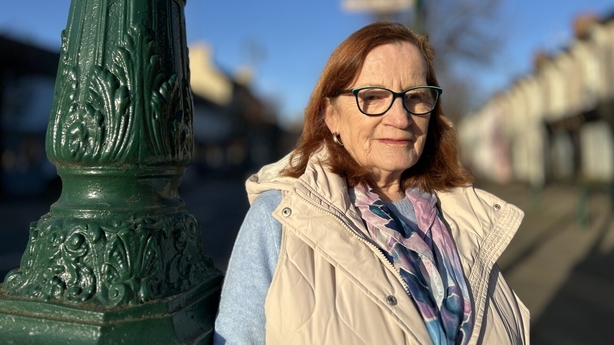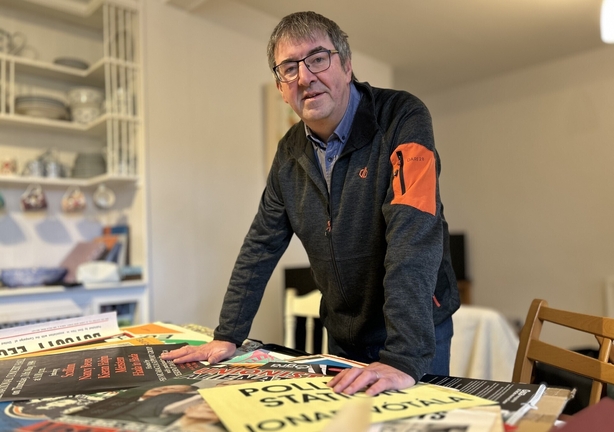It is in the middle of one of the most hotly contested three-seaters in the country, but passing through Abbeyleix in Co Laois, you could be forgiven for not noticing an election is on.
The lampposts are bare, there are no candidate posters.
The move was taken by the local Tidy Towns committee six years ago.
"In 2018, we implemented a no poster policy because they were a blight on the horizon," Mary White, secretary of the Abbeyleix Tidy Towns, said.
She said: "If you have a look at the beautiful poles we have and we have these big ugly posters sticking out, and the visibility ... You wouldn't just have one poster, you could have three posters on each pole all the way in.
"We didn't know what to do about introducing a no poster policy.
"Note I did not use the word 'ban'.
"We were hoping people would come on board.
"We spoke to our local councillors and TDs and said would they have an issue if we didn't allow posters in the town and every one of them was so supportive."

Ms White added: "It was during, after the abortion referendum and there was so many posters all over the place with very graphic images and children would ask about it.
"We felt it wasn't appropriate to have these big posters all over."
The town has now been election poster free since then, spanning referendums, local and general elections.
"Everybody is delighted because when the posters went up, they put them up with care, but they dragged them down over the poles and left the cable ties," she said.
Ms White said it "makes the town tidier and we're very happy".
"But we couldn't have done what we did without the support of the politicians," she said.
Ms White is keen not to characterise it as a "ban" on election posters, but, she said, politicians have been adhering to requests not to put them up.
She also said others, like circuses and other businesses, have been asked not to put their posters up and have been given noticeboard space on the edge of town to advertise their wares.
"It cuts down on waste," she said.
We need your consent to load this rte-player contentWe use rte-player to manage extra content that can set cookies on your device and collect data about your activity. Please review their details and accept them to load the content.Manage Preferences
But does being poster free disadvantage newer candidates who are eager to get their face out there?
"We would say if you're a new candidate, you need to introduce yourself to the people," she said.
"So a little bit of shoe leather walking door to door, that's going to have more of an impact than a poster," she added.
Ms White said that "there would have been a few complaints".
"You know, it's not fair. If you're a new candidate, you need to get your persona out there by working, you know, working for the community,' she said.
Other areas of the country have also opted for a poster free campaign, including other parts of Co Laois, Gort in Co Galway, and the seafront in Dublin Bay North.
However, election posters are a staple of campaigns and have been around as long as elections themselves.
Others, like Alan Kinsella, are not in favour of poster free-zones.
He is a seasoned election watcher.
Since February 1982, Mr Kinsella has been a collector of political ephemera, including around 1,000 posters, and runs irishelectionliterature.com.

"I like the posters," he said, adding that "they tell you there's an election on".
"Not everyone watches the news, not everyone reads the papers, " he said.
"It tells you who's running and also where you are and what constituency you're in," he added.
Mr Kinsella describes posters as "very important".
"They get people talking about politics," he said.
"People might see those posters and get thinking about how they're going to vote and so on," he added.
Mr Kinsella said posters show democracy in action.
He said: "It's only for a couple of weeks.
"In the last five years since the last general election, posters have been up twice.
"It's not as if they're there permanently.
"It's about recognition, especially nowadays.
"Since the early 2000s, the face on the poster is also the face on the ballot paper."
Addressing environmental concerns, he said posters are often re-used, with candidates sometime opting for younger version of themselves.
"You'd see an awful lot of fresh faces now,' he said.
Mr Kinsella said that "new posters are slightly bent,", adding that there is a "new technology where you can just literally put a sticker on top of existing poster".
"So you just cover your old posters with your new face and a lot of candidates have done that," he added.
He said that there are compostable posters that are being used, among other types.
He said: "Ask any candidate and the amount of requests they get for insulation, for pigeon houses, painters, you name it.
"I've insulated my own shed with election posters."
The debate over election posters continues.






